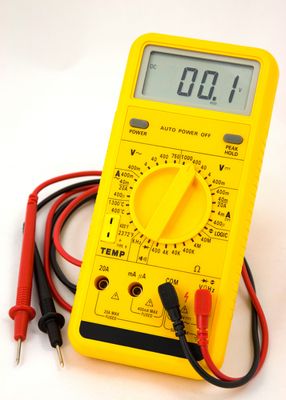Key Takeaways
- A voltage tester is a simple tool used to check for electrical current flow and proper grounding in circuits, featuring a neon bulb and two metal probes.
- To use it, touch the probes to different points in the circuit. A glowing light indicates the presence of electricity, while no light suggests an issue at that point.
- It's essential for diagnosing electrical problems, such as determining if an outlet is faulty or if there's no current coming into an outlet, indicating possible issues like a blown fuse or disconnected wire.
The flow of electrical current is measured by placing an electrical tester at two points in the circuit. A voltage tester is the simplest of these tools. It consists of a small neon bulb with two insulated wires attached to the bottom of the bulb housing; each wire ends in a metal test probe. This type of tester is always used with the current turned on to determine whether there is current flowing through a wire and to test for proper grounding. It is also used to determine whether adequate voltage is present in a wire. Look for a tester rated for up to 500 volts.
To use a voltage tester, touch one probe to one wire or connection and the other probe to the opposite wire or connection. If the component is receiving electricity, the light in the housing will glow. If the light doesn't glow, the trouble is at this point. For example, if you suspect an electrical outlet is faulty, insert one probe of the tester into one slot in the outlet and the other probe into the other slot. The light in the tester should light. If it doesn't, the outlet may be bad.
Advertisement
To further test the outlet, pull it out of the wall. Place one probe of the tester on one terminal screw connection and the other probe on the other terminal screw. If the tester bulb lights, you know the outlet is malfunctioning -- there is current flowing to the outlet, but it isn't flowing through the outlet to provide power to the appliance plugged into it. If the test bulb doesn't light, there is no current coming into the outlet. The problem may be a blown fuse or tripped circuit breaker, or the wire may be disconnected or broken behind the outlet.
Not what you're looking for? Try these:
- Home Repair Tools: Whether you prefer to use the Yellow Pages for anything that needs fixing around the house or consider yourself a regular do-it-yourselfer, there are a handful of tools that everyone should have in their tool box. Learn all about them in this article.
- Electrical Tools: In order to tackle basic electrical problems in your home, there are a handful of tools you'll want to have around. Learn about them in this section.
- Continuity Tester: A continuity tester will help you determine if a particular component of an electrical appliance is carrying electricity. Find out more about continuity testers here.
Advertisement
